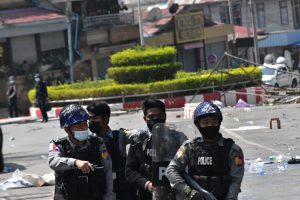Mahatma Gandhi once said that nonviolence is a weapon of the strong. Although deposed Myanmar leader Aung San Suu Kyi is known to have embraced his philosophy, many Myanmar people are turning to armed struggle, hoping to overthrow the junta that seized control on February 1.
What has the Myanmar armed resistance brought, besides increasing the number of casualties?
Since the coup was launched on February 1, the country has been witnessing attacks on civilians by the military on an unprecedented scale. Tatmadaw soldiers are resorting to burning whole villages to terrorize the population, raping and torturing wherever they go. In response to that, People’s Defense Forces (PDF) were formed in many areas to counter the junta forces.
According to some estimates, hundreds of thousands of mostly young people have been receiving underground training in secret locations in the borderlands. It cannot be verified how many are really being trained. Also, some report that joining the PDF is very hard as the groups are fearful of spies.
The PDF has its successes but pays a high price for it. In a clash against raiding military forces, a couple of military officers were recently gunned down in Mandalay before soldiers captured around 10 PDF members.
The PDF also takes actions against the military-appointed administrators of villages and townships, who are believed to spy on the junta-opposing residents. Several have been killed in what we can call an extrajudicial process, prompting many to question the PDF’s code of conduct.
Some believe that the violent actions of the resistance movement are not the main means of overthrowing the regime, but are important nonetheless. “I gave up my pacifist views with the onset of the coup,” declares Mya Oo, a 24-year-old teacher. “The Tatmadaw is breaking wartime standards like no one.”
“The world is watching while terror is shaking Myanmar,” says Gum Tun, an ethnic Kachin man living in Yangon. “Aung San Suu Kyi would never support violence, but we can’t just wait to get help until we die.”
Last month, the U.N. adopted a non-binding resolution calling for an arms embargo, which was a rare show of relative unity among its members. Yet not everyone is willing to work toward restoring democracy in Myanmar. The head of Rosoboronexport, the state-owned spearhead of the Russian arms industry, admitted they continue to supply the junta with military hardware, including aircraft.
“If the U.N. would have responded more quickly, there would be no PDF,” Gum Tun claims. “The military can do whatever they want; the law is in their hands.”
Gum Tun is originally from Hpakant, the jade town, and he is terrified about the reports of renewed fighting in his homeland. “Although the fighting didn’t bring anything positive for us, at least we feel happy when we hear that someone from the junta got killed,” he comments.
The Kachin Independence Army (KIA) and Karen National Union (KNU) have trained the PDF and shared some arms with them. Unfortunately, this remains a David-versus-Goliath war, with deplorable consequences for the civilians. Recently around 200 locals were forced to flee their homes following the shelling by the Tatmadaw. The military was itself responding to the KIA’s attack on a police vehicle and an ambush on a junta-allied militia.
The Rakhine-based Arakan Army (AA) clashed with the Tatmadaw in June, but then released the captured soldiers.
Fresh fighting has also broken out in southern Chin State. The Mindat Resistance Movement was among the first to oppose the junta. Having only traditional hunting guns at their disposal, they were able to knock down the opponent for many days, until the army deployed much heavier equipped forces.
After that, 20,000 civilians went into hiding in the forests, and only pigs are reported to be roaming free in this hillside town controlled by the junta.
Gum Tun is sure that “the only choice is to respond in a violent way, although I can’t even express how it impacts me emotionally.”
But not every ethnic armed group has been able to easily get over the divide and rule policy of the Tatmadaw, which has shaped the landscape in the past decades.
In Shan State, two competing armed groups have waged battles over territory, using thousands of troops and ignoring appeals for peace. The recent call for unity and a truce under a newly formed Shan State Front for Federal (SSFF) and other partners, including monks and intellectuals, has yet to bear fruit.
One of the parties to the conflict, the Restoration Council of Shan State (RCSS), has shown interest in a peaceful resolution to the conflict, while pointing to their current efforts in undermining the presence of the Tatmadaw in the region.
The other armed group, the Shan State Progressive Party (SSPP), is suspected to be backed by the United Wa State Army (UWSA), a group aligned with China. Importantly, the area of their dispute runs through the Myanmar-China Cross Border Economic Cooperation Zones, and China is believed to consider the SSPP an important ally.
However, as the number of casualties and displaced people skyrockets, the regime is facing a a new opponent, one that has lurking behind the headlines for a long time.
COVID-19 is striking Myanmar’s armed forces, spreading to regional command headquarters, battalions, and units in the country’s major cities.
With soldiers, generals, and commanders being infected, chaos is spreading within an institution responsible for crimes against humanity. Lacking oxygen and medical equipment, the generals can only resort to releasing a number of prisoners charged with offenses committed before the coup as a measure to prevent the spread of the virus.
Some hope that COVID-19 might deal a serious blow to the stability of the regime, perhaps even help to change the course of history. It’s a bitter hope, considering the death toll is not limited to the military alone. There can be no hope when there is no vision for the future, and yet the Myanmar people cling to the desire to live in a democratic country.

































